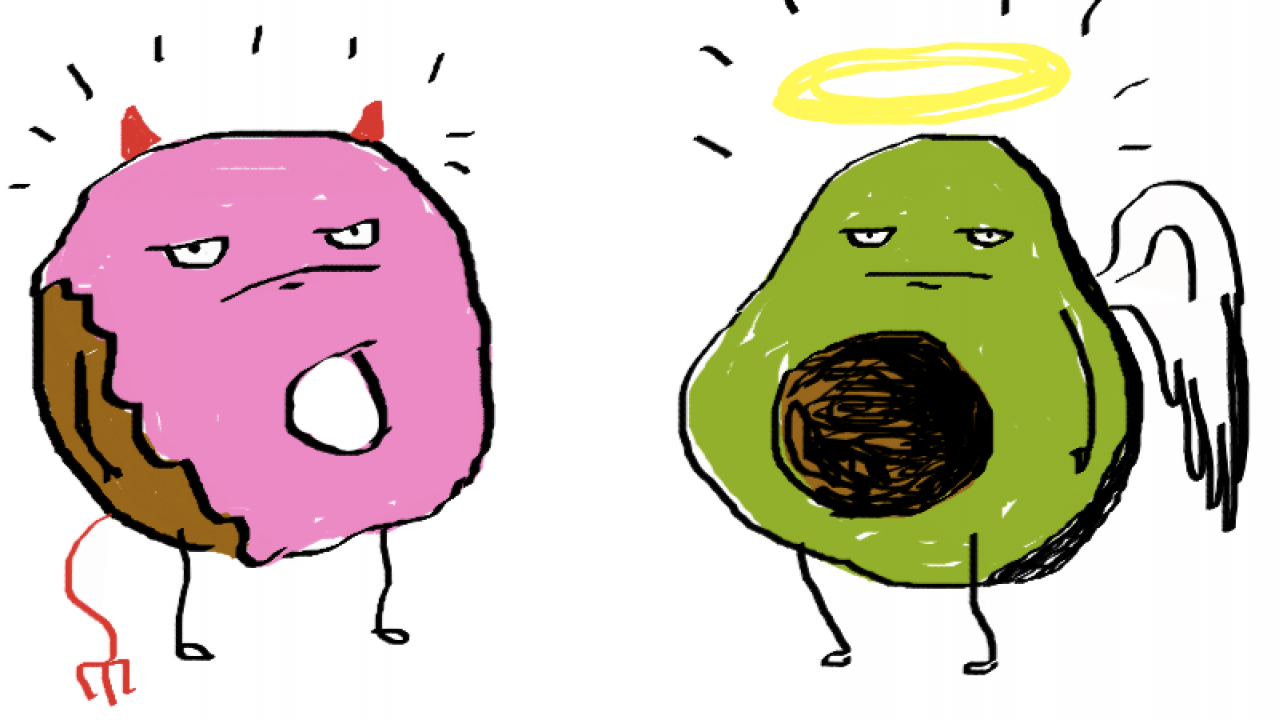
Problematic Diet Culture Vocabulary
By Nutrition Peer Counselor Claire Benoist
Diet culture is a lot like the monsters that used to live in our closet and under our beds as kids: scary and intimidating. With those monsters, we could usually just hide under the covers and try our best to ignore the noises and shadows until we eventually fell asleep. Unfortunately, diet culture is a really big monster that makes a lot of noise, making it difficult to ignore. So, this is one that we are just going to have to face and conquer. Let’s break down some of the most common diet culture vocabulary words, and tackle this beast one word at a time.
Cheat Let’s start by break down the word cheat. In school, cheating on an exam or on an assignment, results in serious disciplinary action. In a relationship, cheating breaks trust and can lead to breakups and divorce. Cheating is an ugly thing that leads to heartbreaking consequences. This word does not belong anywhere near food. Using cheat or cheating to describe meals and treats makes us believe, even subconsciously, that we are doing something morally wrong. And in case no one has told you recently, there is nothing wrong with indulging in your favorite foods.
I am a big believer that we shouldn’t need cheat days. We should be able to enjoy all foods without rules or the need to break them. Prioritizing a balanced diet filled with fruits, vegetables, healthy fats, proteins and whole grains means exactly that: we are prioritizing those foods. Meaning we can also eat all the other foods we want, too!
The bottom line, call “cheat meals” what they are: pizza, ice cream, a treat, a food that reminds you of your childhood, comfort food, a traditional family recipe…and whatever you call it, savor it and leave cheating out of it.
Guilt-free Food can be and do a lot of things. It provides us with necessary nutrients that fuel our everyday activities. It can be a celebration of culture or religion. It can provide comfort and pleasure. It can be nostalgic. But food does not and cannot hold moral value. Nothing you eat can make you a bad person for eating it. This term “guilt-free” insinuates that you should feel guilty when you eat something that isn’t a fruit, vegetable or whole grain. Well, we at Healthy Aggies are here to tell you, that’s not true!
Natural Natural is one of those buzz words that sounds so good. #nofilter am I right? A study conducted by Ohio State University showed that people believe that foods featuring the words “natural” or “all-natural” on their labels are of higher quality and nutritional content and are therefore willing to pay more for those foods. But what does natural actually even mean on a food label?
The Food and Drug Administration (FDA) defines a food as natural when it contains “nothing artificial or synthetic (including all color additives regardless of source)”. That’s a very broad definition that can describe a lot of foods. For example, sugar is a natural product. It’s extracted from plants and then goes through processing to be purified, lightened, dried and packaged for distribution. Nothing artificial and no coloring added. But as we all know, table sugar isn’t exactly high in nutritional content or quality. So, save your dollars Aggies, natural is just a marketing buzz word brought to you by our old friend diet culture that doesn’t actually tell you much about its contents.
Processed This is a big one. But let’s break it down. Yes, some processed foods have a ton of added sugars, saturated fats, sodium and a lot of other ingredients that are questionable at best. But that’s not the only example of processed foods. Nuts and seeds have to be processed (shelled, roasted and ground) to become nut or seed butters. Frozen produce is processed (washed and cut) before it is packaged and stocked in your local grocery store freezer. Fruits have to be processed (pressed) to become fruit juice. See? Processed foods aren’t that scary after all!
Clean I’ll keep this one short: unless your food has literal dirt on it, it’s clean!
Words are powerful. They can have a significant psychological effect on us whether we realize it or not. Diet culture is not a monster we will defeat overnight or in a single article. But the more we know, and the more we break down the myths we are led to believe, the less powerful it will eventually become. Happy eating, Aggies!